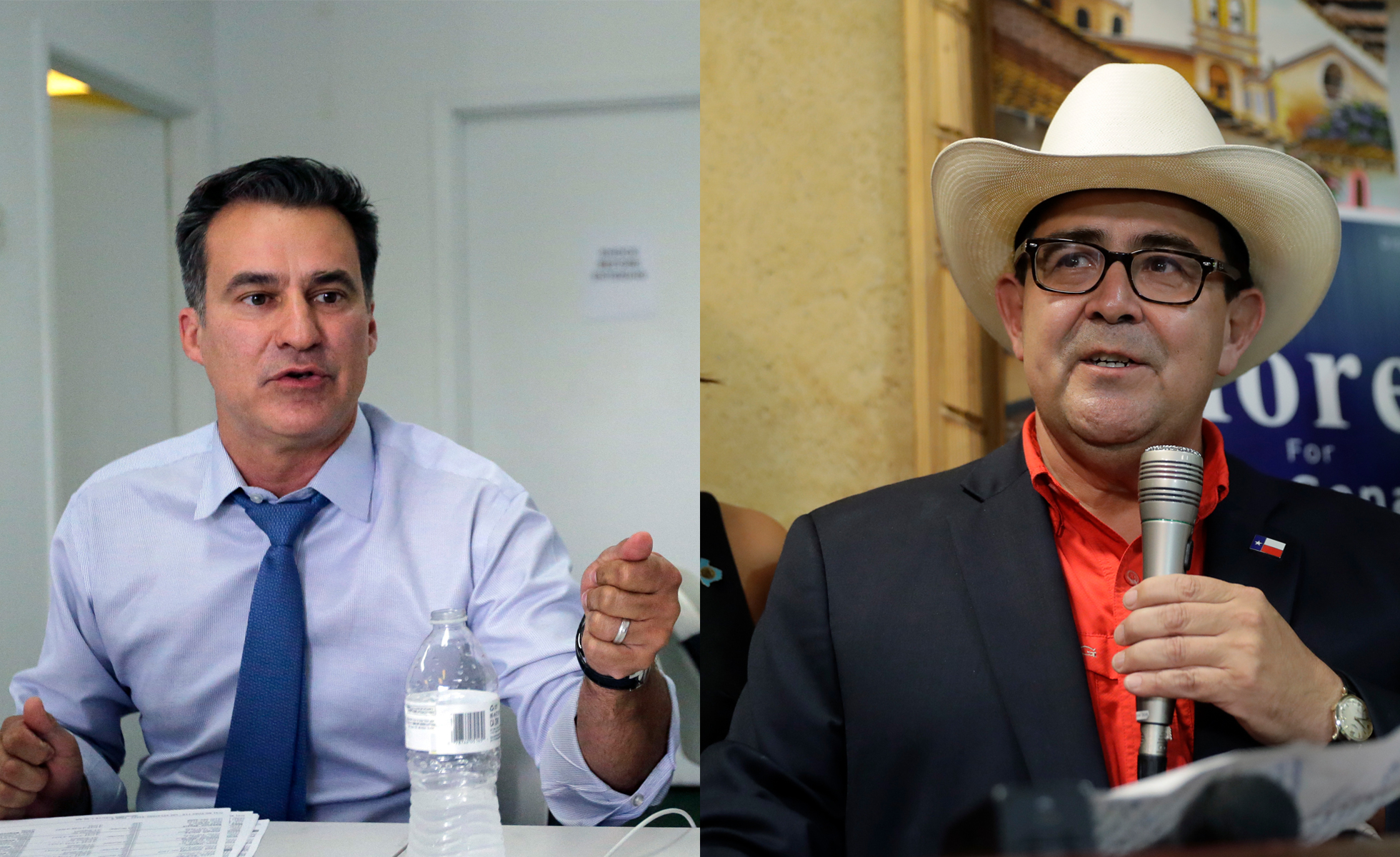
If elected to the Texas Senate, Roland Gutierrez promises not to end his tenure in federal prison. During a September phone call, the six-term state House rep assured me: “I’ve led my life as a responsible person; my parents raised me right.”
It’s a low bar. But Democrats in state Senate District 19—a sprawling district rooted in San Antonio that sweeps down to Eagle Pass and all the way out to far West Texas—have to start somewhere. The last liberal to hold the seat, Carlos Uresti, stepped down in 2018 just before being sentenced to 12 years’ incarceration for fraud and bribery. Now, after cinching the Democratic nomination in July, it’s up to Gutierrez to carry the torch of noncriminal progressive governance in SD-19.
The race won’t make the marquee this November. In Texas, the big-ticket fights are over the presidency, the U.S. Senate, and the state House. But a Gutierrez win would reassert Democratic control of a historically blue stronghold. It could also force a battle at the Capitol over the state Senate’s supermajority voting rules. And lastly—forgive me, reader, for mixing hope and Texas politics—it could even get the ball rolling on legal marijuana.
Standing in Gutierrez’s way: The Republican who’s held the seat the last two years, a former game warden by the name of Pete Flores—the bespectacled, cowboy hat-wearing embodiment of one of the Democrats’ worst electoral blunders in recent years.
A Gutierrez win would reassert Democratic control of a historically blue stronghold.
Back in September of 2018, when most Americans had never heard of a coronavirus and a fellow named Beto looked like he just might pull it off, Flores won a special election runoff for SD-19 against former Democratic congressman Pete Gallego. The news shocked the Texas political world. Democrats had held the seat for 139 years. The explanations and excuses flew.
Democrats accused Governor Abbott of “stealing” the election by holding it early, rather than waiting for November when turnout would be higher. But it wasn’t theft—just hardball politics. Expecting urban Bexar County turnout to be dangerously low for Democrats, Lieutenant Governor Dan Patrick and Republican funders poured money into Flores’ coffers. The GOP juiced turnout in red parts of the district like Medina County. Ultimately, 80 percent fewer voters cast ballots than when the seat was up in 2016.
Errors abounded on the Democratic side as well. For starters, Carlos Uresti’s convictions may have left a sour taste in liberal voters’ mouths. Then, Gallego let Flores dominate TV advertising. Gallego also deployed the slogan “I Trust Pete”—against an opponent with the same first name. Plus, just to get to the runoff, Gallego spent the earlier primary locking horns with none other than Roland Gutierrez, this year’s Democratic candidate, eating up Gallego’s money. To make matters worse, Gutierrez never endorsed Gallego (a consultant for Gutierrez said in 2018 that Gallego “never reached out”).
At Flores’ election night party that September, the celebration turned triumphalist. “All this talk about a ‘blue wave’? Well, the tide is out,” crowed Dan Patrick. But the Lieutenant Governor proved a poor oceanographer. Two months later, Democrats picked up 12 state House seats, two state Senate seats, and Beto came, as he might say, real fucking close to unseating Ted Cruz. The voters of SD-19 chose Beto over Cruz by 15 points.
Now, in a presidential election year, most observers expect high turnout and a return to SD-19’s Democratic roots. Sixty percent of the district’s population is in Bexar County; 78 percent are nonwhite. Out of five political scientists I consulted, four said Gutierrez is very likely to recapture the seat. “It’s the Democrats’ to lose,” summarized Sylvia Gonzalez-Gorman, a professor at the University of Texas-Rio Grande Valley. The lone exception was Sharon Navarro, of UT-San Antonio, who argued that Flores’ incumbency, strength in rural areas, and messaging on property taxes should see him through to reelection.
“It’s the Democrats’ to lose.”
Gutierrez himself is confident. In our interview last month, the native San Antonian repeatedly assured me he’s campaigning hard and “taking nothing for granted”—but he also let his certitude shine through. “At the end of the day, the difference in this race is going to be 12 points,” he said at one point. “They’re gonna have to raise $5 million to win this race and even then [they might not win],” he said later.
Since July, Flores has pulled in about $628,000, with more than 70 percent coming from a trio of conservative PACs: the Associated Republicans of Texas; the D.C.-based Republican State Leadership Committee; and Texans for Lawsuit Reform, an organization dedicated to shielding businesses from lawsuits by workers and consumers. Those donations piled onto the more than $500,000 he already had on hand. Gutierrez, meanwhile, has only taken in about $199,000 since July—though he did so with more than four times as many separate contributions as Flores over the same period.
Gutierrez is running on gun reform (pro) and marijuana (pro). On the latter issue, he’s even previewed a bill that would legalize medicinal and recreational marijuana use and promote the cannabis industry in Texas. For Gutierrez, the bill would serve a joint purpose: advancing criminal justice reform and increasing tax revenue. Next year, lawmakers will be staring down state coffers partly cashed out by the COVID-induced economic crisis, and they’ll need to find new pots of money. Gutierrez predicts his bill would yield billions in new revenue—but only if Texas develops a homegrown industry before marijuana is federally legalized. With his critics, the state rep is blunt: “Cannabis is highly medicinal; for anyone to say it’s not, they’re just liars or idiots.” There are, however, some oddities in the weeds of his proposal, such as $150 million for border security in a state that already spends lavishly on that project. (Whew, end of puns.)
A political consultant for Flores declined to make the senator available for an interview or to answer written questions, but in an obsequious interview last year with the conservative website The Texan, Flores laid out his reelection case. He said the end of straight-ticket voting, which formerly allowed Texans to select all candidates of a party with one punch, should improve his odds. And while Flores holds core right-wing views, such as opposing same-sex marriage and supporting school vouchers, he’s emphasizing meat-and-potato issues. He touts his role, for example, in bringing home $200 million last year for a San Antonio state hospital—though Gutierrez contends Flores was inessential to procuring that funding.
Echoing claims long made by Republicans seeking inroads in Hispanic South Texas, Flores told The Texan he suits his district. “This is a very conservative district … very religious, very family oriented, second amendment, pro-life,” he said. “What I tell [voters] is we believe the same thing—but the Democratic Party that you think you still belong to, the party of John Kennedy, is no longer here.”
If Flores is wrong, and Gutierrez wins, it will likely force the lieutenant governor to make a decision. In the state Senate, bills generally require the support of three-fifths of the chamber to advance. If the Republicans lose a seat, they’ll be one below that threshold, meaning they could struggle to pass important bills, such as new congressional and state legislative maps next year. Patrick successfully reduced the supermajority requirement once before, and has suggested he’d do so again. Democrats would likely decry the move as a grievous blow to bipartisan compromise—though many observers have noted that, at least since 2011, the rule has been seriously compromised through a bevy of exceptions.
The SD-19 race may or may not shake up the 2021 legislative session, but a Gutierrez win would likely put Democrats in their strongest position in the chamber since 2001. And that’s something. Depending on redistricting, and barring a future Tea Party-style reactionary revival, perhaps it would be one step in a long march to retaking the chamber. I’ll confess, as any sufficiently humble prognosticator must, that the voters will decide such matters.
November, with all due respect, would you hurry up already?
Read more from the Observer:
-
Trump’s Favorite Texas Sheriff Faces Re-Election Amid a Spike in Deaths at His Jail: Conservative media have turned Tarrant County Sheriff Bill Waybourn into a right-wing celebrity despite a long list of scandals on his watch.
-
The Work is All of Us: Undocumented and disabled, the members of the Living Hope Wheelchair Association offer a vision for a more caring future.
-
Erika Andiola Says Dreamers Know How to Push Biden: “All we can do is pick our opponent,” says Andiola, the chief advocacy officer for the San Antonio-based immigrant rights group RAICES Action.



